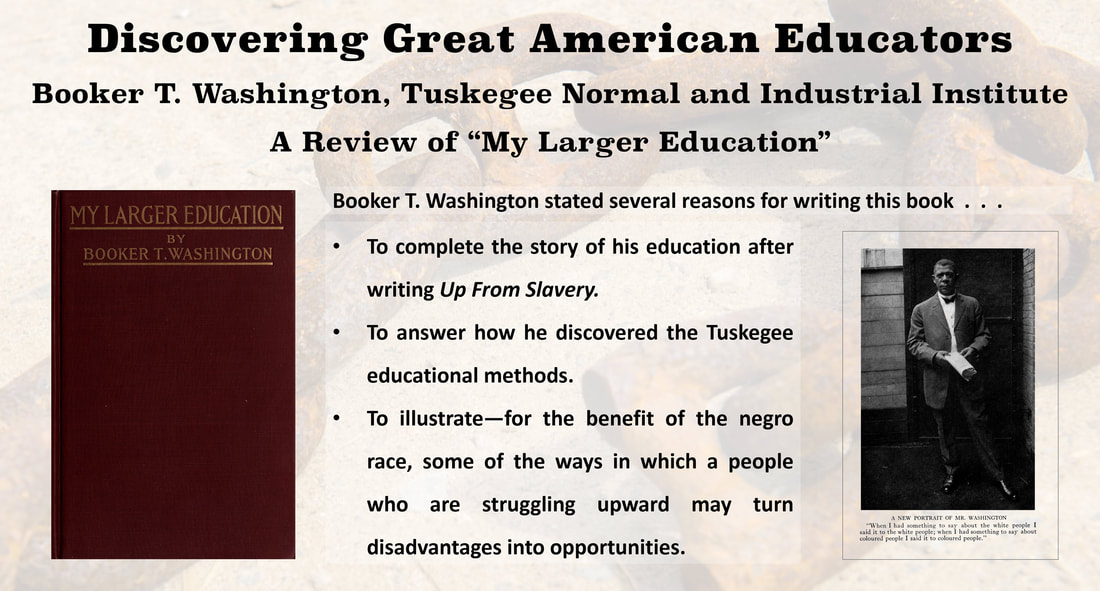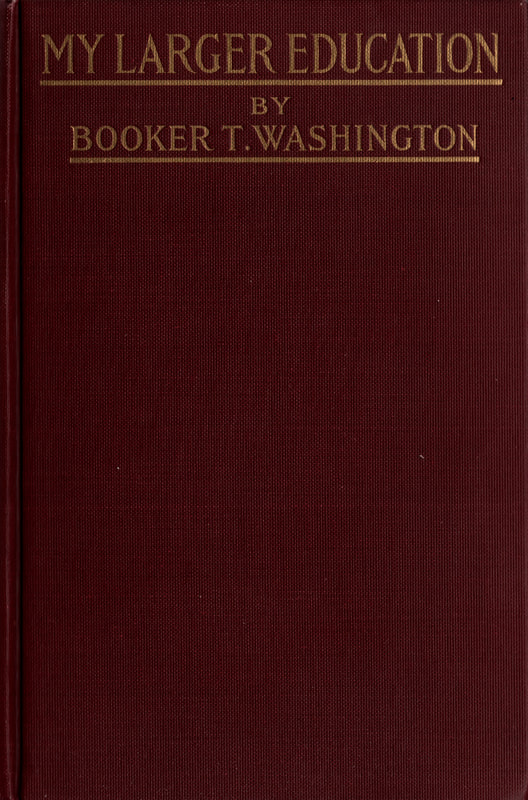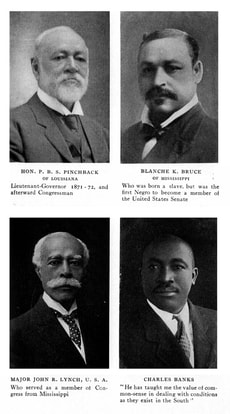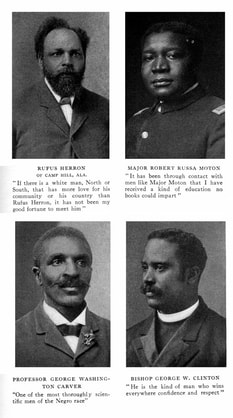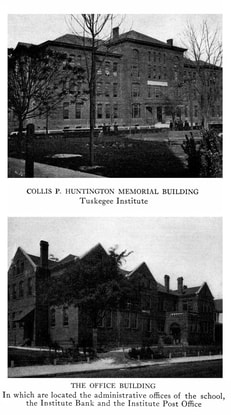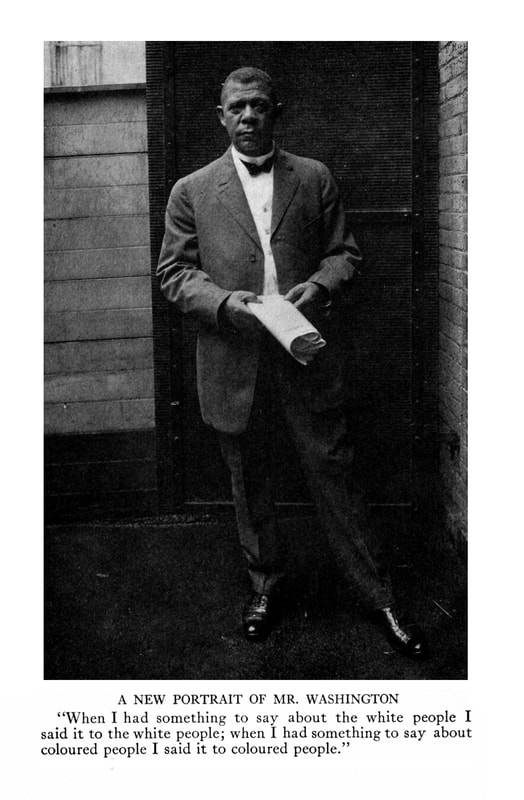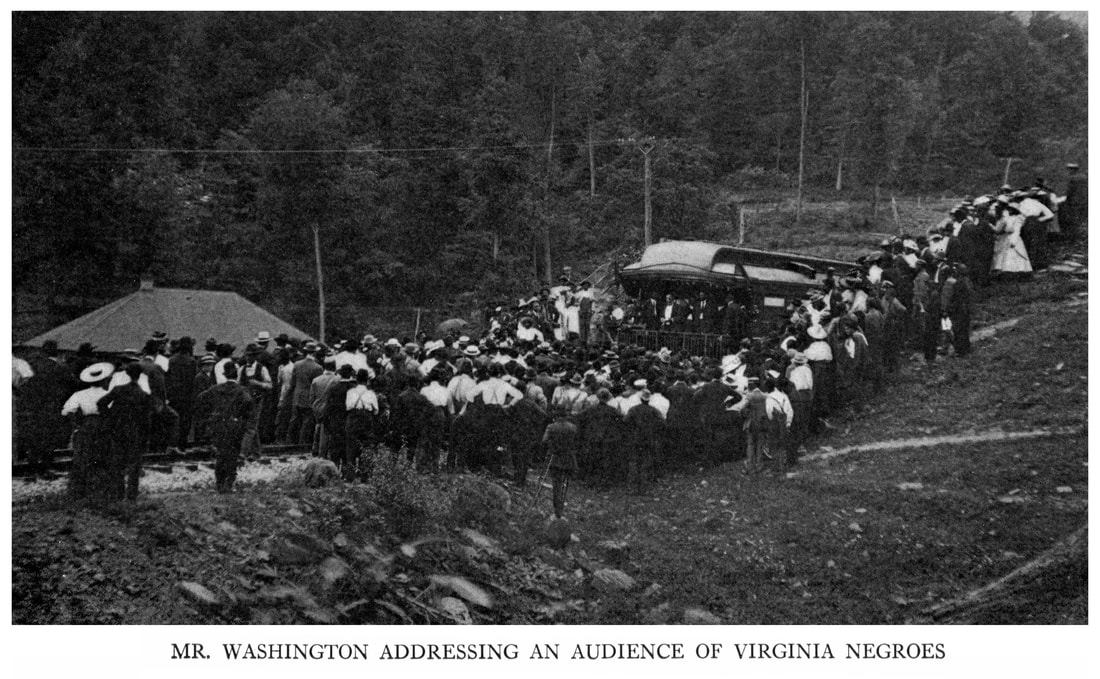Review of Booker T. Washington's "My Larger Education"
|
|
Date Published: March 15, 2023
Date Modified: February 3, 2024 |
“In My Larger Education, Dr. Booker T. Washington, the negro educator for the first time draws the veil from his famous dinner at the White House with the then President [Teddy] Roosevelt and his family. … For many years, through all the stirring times of the Roosevelt Administration, Dr. Washington steadfastly refused to utter or write a word regarding this incident. …
“[The book] is a frank and interesting autobiography of the educator’s career.”
“[The book] is a frank and interesting autobiography of the educator’s career.”
The Pittsburgh Post, “Book Reviews,” 1912
A Review of Booker T. Washington's "My Larger Education"
- Reviews of the Day: 1911–12
- Selected Insights from "My Larger Education"
- Washington on Life’s Difficulties
- Washington on Getting a Larger Education
- Washington on Public Speaking
- This Author’s Thoughts on "My Larger Education"
Reviews of the Day: 1911–12
|
”Dr. Booker T. Washington’s latest book, My Larger Education, … is a continuation from where he left off in his Up from Slavery. It fairly teams with interest, telling as it does in a straight, frank manner his relations to his own people, to the Southern white people and with men of prominence everywhere.
"In many regards, we regard it as Dr. Washington’s best work.” [See Footnote #1] The Washington Bee, November 1911
“No one is so ignorant or prejudiced as to assert that the advancement toward civilization of the negroes, even in ‘the land of the free,’ has been along flower-bordered paths. Their progress has been obstructed in many ways—by ignorance, race instinct, their own constitutional limitations, and poverty. …
|
“Even during slavery days some blacks here and there arose to considerable eminence. Benjamin Banneker was an astronomer of some note—studying the subject while working in the fields. … Ira Aldridge, who became a successful tragedian, was highly honored by the crowned heads of Europe. … Since emancipation the list has been greatly lengthened. … The foremost negro of his day is Booker T. Washington.
“For the first time, [he] explains his attitude toward politics. … [he] claims that meeting and association with well-informed whites and blacks assisted him most in acquiring a ‘larger education.’ ”
“For the first time, [he] explains his attitude toward politics. … [he] claims that meeting and association with well-informed whites and blacks assisted him most in acquiring a ‘larger education.’ ”
The Nashville Banner, “My Larger Education,” 1911
“One of the best chapters is ‘The Mistakes and the Future of Negro Education.’ In it, Dr. Washington declares that ‘never in the history of the world has a people, coming so lately out of slavery, made such efforts to catch up with and attain the highest and best in the civilization above them. … I ought to add, that never in the history of the world has there been a more general effort on the part of one race to help civilize and build up another than has been true of the American white and the negro.
‘I say this because it should be remembered that, if the white man in America was responsible for bringing the negro here and holding him in slavery, the white man in America was equally responsible for giving him his freedom, and the opportunities by which he has been able to make the tremendous progress of the last forty-eight years.’ ”
‘I say this because it should be remembered that, if the white man in America was responsible for bringing the negro here and holding him in slavery, the white man in America was equally responsible for giving him his freedom, and the opportunities by which he has been able to make the tremendous progress of the last forty-eight years.’ ”
The Brooklyn Daily Eagle, “Education for the Negro,” 1911
One review mentioned that the book’s collection of pictures was superlative. One of the pictures is the image of Booker T. Washington standing that is included further below. Here are three others from the book, two of which, show the pictures of individuals Mr. Washington writes about in the book:
Selected Insights from "My Larger Education"
Like one of the reviewers above, this author found “The Mistakes and the Future of Negro Education” fascinating. Others that he would recommend are: (1) “Learning from Men and Things,” (2) “The Intellectuals and the Boston Mob,” (3) “Meeting High and Low in Europe,” and (4) “Building a School.”
Here are some Booker T. Washington’s insights:
Here are some Booker T. Washington’s insights:
|
- Booker T. Washington on Life's Problems and Difficulties “A wider acquaintance with men in all the different grades of life taught me that the Negro’s case is not peculiar. The majority of successful men are persons who have had difficulties to overcome, problems to master; and, in overcoming those difficulties and mastering those problems, they have gained strength of mind and a clearness of vision that few persons who have lived a life of ease have been able to attain.
“Experience has taught me, in fact, that no man should be pitied because every day he faces a hard, stubborn problem; but rather, it is the man who has no problems, to solve, no hardships to face, who is to be pitied. “His misfortune consists in the fact that he has nothing in his life which will strengthen and form his character; nothing to call out his latent powers, and deepen and widen his hold on life.” |
Booker T. Washington
|
- Booker T. Washington on Getting a Larger Education
“If I have learned much from things, I have learned more from men. The work that I started to do brought me early in contact with some of the most generous, high-minded, and public-spirited persons in the country. … I have tried to indicate what I have learned from contact with those men.
“Perhaps I can best indicate the way in which I have been educated by my contact with these men if I tell something of my relations with one man from whom, after General Armstrong, my first teacher, I learned, perhaps, more than from any other.
“I refer to the late William H. Baldwin, Jr.” [See Footnote #2]
“Perhaps I can best indicate the way in which I have been educated by my contact with these men if I tell something of my relations with one man from whom, after General Armstrong, my first teacher, I learned, perhaps, more than from any other.
“I refer to the late William H. Baldwin, Jr.” [See Footnote #2]
- Booker T. Washington on Public Speaking
“To me, talking to an audience is like talking to an individual.
|
"Each audience has a personality of its own, and one can no more find two audiences that are exactly alike than he can find two individuals that are exactly alike. The speaker who fails to adapt himself to the conditions, surroundings, and general atmosphere of his audience in a large degree fails, I think, as a speaker.
“I have found that the best plan [for public speaking] is … to study one’s subject through and through, to saturate himself with it so that he is master of every detail, and then use headlines [speaker’s notes] as a memorandum." |
This Author's Thoughts on "My Larger Education"
I have now [March 14, 2023] read three of Booker T. Washington’s books. All are recommended; they are superlative. I am going to rank them because I am sure most individuals will not have time to read all three of these works. The priority I would give them is: (1) Character Building, (2) Up from Slavery and (3) My Larger Education. (links are provided to my reviews of the other two works.
|
I highly recommend this book. Booker T. Washington’s books are in the public domain and available to be read on one’s phone, tablet or workstation. So, access and cost are not excuses. Just the time and willingness to be enlightened.
Select the image, download the book and read it on your phone. Now it is only a question of time. … … and willingness! Cheers, - Peter E. |
Select image to download "My Larger Education"
in PDF format at Hathitrust.org |
Footnote #1: The Library of Congress writes: “The Washington Bee focused much of its attention on the activities of the city’s African Americans, and its society page paid special attention to events at local black churches. The paper also covered national issues; by the turn of the 20th century it was publishing articles about events across the country by its own correspondents as well as from wire services. Like most publications of the day, there was also an extensive array of advertising, much from white-owned businesses. The remaining space included the typical filler content purchased from various sources. … The initial motto of the paper was ‘Sting for Our Enemies—Honey for Our Friends.’ Civil rights for America’s blacks was a primary concern.”
Footnote #2: A review of An American Citizen: Life of William Henry Baldwin, Jr. is available here. Julius Rosenwald, one of the founders of Sears, Roebuck & Company and supporter of Booker T. Washington and the Tuskegee Institute wrote that two books influenced him more than any two books he “ever read.” They were Up from Slavery by Booker T. Washington and An American Citizen, the Life of William H. Baldwin, Jr. by John Graham Brooks.
Footnote #2: A review of An American Citizen: Life of William Henry Baldwin, Jr. is available here. Julius Rosenwald, one of the founders of Sears, Roebuck & Company and supporter of Booker T. Washington and the Tuskegee Institute wrote that two books influenced him more than any two books he “ever read.” They were Up from Slavery by Booker T. Washington and An American Citizen, the Life of William H. Baldwin, Jr. by John Graham Brooks.
